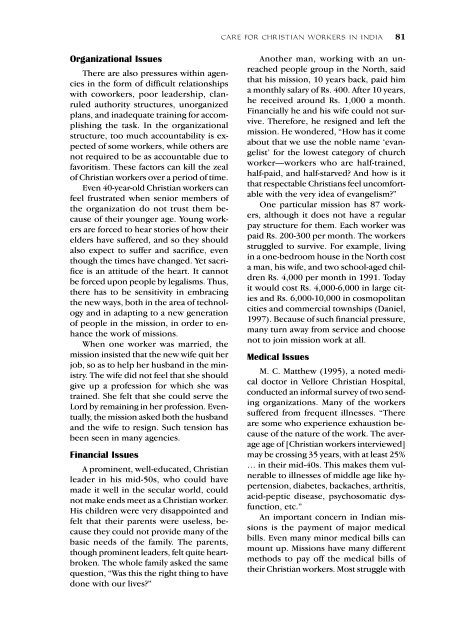Part 2 Regional Issues and Insights - World Evangelical Alliance
Part 2 Regional Issues and Insights - World Evangelical Alliance
Part 2 Regional Issues and Insights - World Evangelical Alliance
You also want an ePaper? Increase the reach of your titles
YUMPU automatically turns print PDFs into web optimized ePapers that Google loves.
care for christian workers in india 81<br />
Organizational <strong>Issues</strong><br />
There are also pressures within agencies<br />
in the form of difficult relationships<br />
with coworkers, poor leadership, clanruled<br />
authority structures, unorganized<br />
plans, <strong>and</strong> inadequate training for accomplishing<br />
the task. In the organizational<br />
structure, too much accountability is expected<br />
of some workers, while others are<br />
not required to be as accountable due to<br />
favoritism. These factors can kill the zeal<br />
of Christian workers over a period of time.<br />
Even 40-year-old Christian workers can<br />
feel frustrated when senior members of<br />
the organization do not trust them because<br />
of their younger age. Young workers<br />
are forced to hear stories of how their<br />
elders have suffered, <strong>and</strong> so they should<br />
also expect to suffer <strong>and</strong> sacrifice, even<br />
though the times have changed. Yet sacrifice<br />
is an attitude of the heart. It cannot<br />
be forced upon people by legalisms. Thus,<br />
there has to be sensitivity in embracing<br />
the new ways, both in the area of technology<br />
<strong>and</strong> in adapting to a new generation<br />
of people in the mission, in order to enhance<br />
the work of missions.<br />
When one worker was married, the<br />
mission insisted that the new wife quit her<br />
job, so as to help her husb<strong>and</strong> in the ministry.<br />
The wife did not feel that she should<br />
give up a profession for which she was<br />
trained. She felt that she could serve the<br />
Lord by remaining in her profession. Eventually,<br />
the mission asked both the husb<strong>and</strong><br />
<strong>and</strong> the wife to resign. Such tension has<br />
been seen in many agencies.<br />
Financial <strong>Issues</strong><br />
A prominent, well-educated, Christian<br />
leader in his mid-50s, who could have<br />
made it well in the secular world, could<br />
not make ends meet as a Christian worker.<br />
His children were very disappointed <strong>and</strong><br />
felt that their parents were useless, because<br />
they could not provide many of the<br />
basic needs of the family. The parents,<br />
though prominent leaders, felt quite heartbroken.<br />
The whole family asked the same<br />
question, “Was this the right thing to have<br />
done with our lives?”<br />
Another man, working with an unreached<br />
people group in the North, said<br />
that his mission, 10 years back, paid him<br />
a monthly salary of Rs. 400. After 10 years,<br />
he received around Rs. 1,000 a month.<br />
Financially he <strong>and</strong> his wife could not survive.<br />
Therefore, he resigned <strong>and</strong> left the<br />
mission. He wondered, “How has it come<br />
about that we use the noble name ‘evangelist’<br />
for the lowest category of church<br />
worker—workers who are half-trained,<br />
half-paid, <strong>and</strong> half-starved? And how is it<br />
that respectable Christians feel uncomfortable<br />
with the very idea of evangelism?”<br />
One particular mission has 87 workers,<br />
although it does not have a regular<br />
pay structure for them. Each worker was<br />
paid Rs. 200-300 per month. The workers<br />
struggled to survive. For example, living<br />
in a one-bedroom house in the North cost<br />
a man, his wife, <strong>and</strong> two school-aged children<br />
Rs. 4,000 per month in 1991. Today<br />
it would cost Rs. 4,000-6,000 in large cities<br />
<strong>and</strong> Rs. 6,000-10,000 in cosmopolitan<br />
cities <strong>and</strong> commercial townships (Daniel,<br />
1997). Because of such financial pressure,<br />
many turn away from service <strong>and</strong> choose<br />
not to join mission work at all.<br />
Medical <strong>Issues</strong><br />
M. C. Matthew (1995), a noted medical<br />
doctor in Vellore Christian Hospital,<br />
conducted an informal survey of two sending<br />
organizations. Many of the workers<br />
suffered from frequent illnesses. “There<br />
are some who experience exhaustion because<br />
of the nature of the work. The average<br />
age of [Christian workers interviewed]<br />
may be crossing 35 years, with at least 25%<br />
… in their mid-40s. This makes them vulnerable<br />
to illnesses of middle age like hypertension,<br />
diabetes, backaches, arthritis,<br />
acid-peptic disease, psychosomatic dysfunction,<br />
etc.”<br />
An important concern in Indian missions<br />
is the payment of major medical<br />
bills. Even many minor medical bills can<br />
mount up. Missions have many different<br />
methods to pay off the medical bills of<br />
their Christian workers. Most struggle with
















